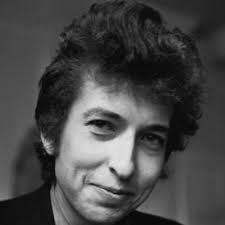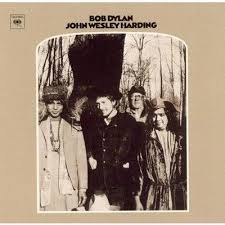John Wesley Harding
| Bob DylanJohn Wesley Harding
John Wesley Harding is the eighth studio album by American singer-songwriter Bob Dylan, released on December 27, 1967, by Columbia Records. Produced by Bob Johnston, the album marked Dylan's return to semi-acoustic instrumentation and folk-influenced songwriting after three albums of lyrically abstract, blues-indebted rock music. John Wesley Harding shares many stylistic threads with, and was recorded around the same time as, the prolific series of home recording sessions with the Band, partly released in 1975 as The Basement Tapes, and released in complete form in 2014 as The Bootleg Series Vol. 11: The Basement Tapes Complete.-Wikipedia
Critic Reviews
Show All-
 Rolling Stone
Rolling Stone
February 11, 1968. The new Bob Dylan album is out and on our turntables and coming at us over the airwaves (though not enough of it is coming at us over the airwaves, God knows) and it is a warm, loving collection of myths, prophecies, allegories, love songs and good times.
-
 Rolling Stone
Rolling Stone
February 24, 1968. Without a doubt this is another major musical step for Bob Dylan. The predominance of country blues, white and black, from Hank Williams to Leadbelly is unprecedented in the new electric music.
-
 All Music
All Music
A calm, reflective album, John Wesley Harding strips away all of the wilder tendencies of Dylan's rock albums -- even the then-unreleased Basement Tapes he made the previous year -- but it isn't a return to his folk roots. If anything, the album is his first serious foray into country, but only a handful of songs, such as "I'll Be Your Baby Tonight," are straight country songs.
-
 Goldmine Magazine
Goldmine Magazine
May 24, 2011. John Wesley Harding works together sequentially so well the same way that the songs of Sgt. Pepper work so well together — not in terms of creating a narrative, but in a sense of all adding up to a certain collective statement. A certain description of a mental, emotional and intuitive place in the mind that is both new and old. This album is timeless.
-
 PopMatters
PopMatters
October 9, 2000. Bob Dylan's John Wesley Harding is an album of half-spoken secrets, hushed whispers, illegible writings, and missing pages. It is grainy black and white. It has the feel of antiquity settled on it like decades upon decades of quietly accumulating dust. It is beautifully anachronistic and elusive. It is hard, gritty, seemingly impenetrable. It is blindingly complex; addictively rewarding. All this is to say that it is classic Bob Dylan.
-
 The Absolute Sound
The Absolute Sound
July 20, 2017. Somehow the sober, stripped-down recording seems to fit Dylan’s new persona (part moralist, part mystic), his lyrics and voice both conjuring up an older America. Razor-sharp in its presentation of clean-sounding drums, taut bass, a tamed (i.e., less shrill) harmonica, and Dylan’s rich, understated vocals, MoFi’s remastered JWH brings things clearly into focus for an album that will always serve as a model for those who believe less is more.
-
 Classic Rock Review
Classic Rock Review
December 27, 2017. This simple, folk and country album with a slight hint of spirituality was a notable departure from the Dylan’s previous three albums in 1965 and 1966 (Bringing It All Back Home, Highway 61 Revisited and the double-length Blonde On Blonde).
-
 Ultimate Classic Rock
Ultimate Classic Rock
December 27, 2015. But most of all, John Wesley Harding was one of the clearest signs that one of our most important artists would never be pigeonholed again. Starting with this terrific, mostly acoustic album, any curveballs that Dylan threw over the next four decades would not be totally unexpected.
-
 Sputnik Music
Sputnik Music
May 3, 2006. Overall, I would give this album a 4.9 if I could - holding off on the 5 only because it isn't 'classic' in the strictest sense of the word. However, it is one of Bob Dylan's most perfect albums, and I highly recommend it to anyone who has got everything up to Blonde on Blonde pretty well in hand.
-
 Bob-Dylan.org.uk
Bob-Dylan.org.uk
February 2, 2015. This is an album that like a dream, starts from something we half know from having read a book or seen it on TV, and then takes us into a world where everything is turned upside down, and nothing is real any more, before neatly returning us to the real world at the end.
-
 U.S. Intellectual History Blog
U.S. Intellectual History Blog
June 13, 2018. John Wesley Harding‘s songs are not confessional in the way many of Dylan’s other songs were or would be, not confessional in the way the singer-songwriter era, soon to come, would be. These songs are confessional in a religious sense.
-
 MoFi
MoFi
Stripped-back, unobtrusive 1967 album a mellow return to Dylan's roots and harbinger of country rock.
-
 Elsewhere
Elsewhere
July 8, 2018. The Dylan mysteries and myths sketched out of John Wesley Harding became a continuum. It was an album out of time which is why it still engages today. It is musically simple but lyrically deep, it is serious and playful.
-
 Countdown Kid
Countdown Kid
May 29, 2013. After a year-and-a-half of silence, Bob Dylan returned to action in the winter after the Summer of Love with 1967’s John Wesley Harding. In typical Dylan fashion, his music zigged while the rest of the world zagged, as the album featured a bunch of hushed, mysterious parables and an earthy sound, far removed from the prevailing psychedelic music of the counterculture.
-
 Super Audio CD Reference
Super Audio CD Reference
October 15, 2005. This one's plain vanilla, folks. The instrumentation is sparse, with just Dylan's acoustic guitar & harmonica, electric bass and drums. The only real standouts are "All Along The Watchtower" (natch!), and "I'll Be Your Baby Tonight"--the other tunes are quite pedestrian, especially when compared to his best work.
-
 Norman Records
Norman Records
John Wesley Harding, released in 1967, is a key album for Bob Dylan, as it finds him taking a left-hand turn from his beat-poet electric music into the territory of folk, country, and God. But as this is only the first step in that direction, it makes a good introduction into that period of the great man’s catalogue.
-
 Wilson & Alroy's Record Reviews
Wilson & Alroy's Record Reviews
Reacting against the drug-fueled experimentation of the Summer Of Love, Dylan retreated to minimal arrangements and religious themes here; many find the atmosphere hypnotic but I tend to wonder "What the hell is this man talking about?
-
 itunes Apple Music
itunes Apple Music
This 1967 album transcended easy categorization as Bob Dylan moved from the experimentation and rock of his few previous releases. Cut in Nashville with a loose-limbed backing trio, the songs are mostly country-folk parables that, even at their most jaunty, like the plainspoken title track, are filled with mystery and distrust. . . .
-
 Backseat Mafia
Backseat Mafia
December 26, 2017. This is Dylan returning to his acoustic roots, but instead of reprising the finger-pointing protest of his early material, he went all country-rock and used all manner of religious imagery in his songwriting.
-
 Internet Monk
Internet Monk
March 26, 2014. Early in his career, Dylan had called Guthrie, “the true voice of the American spirit,” and committed himself to becoming “Guthrie’s greatest disciple.” Later that year, Dylan would come out of his self-imposed exile and release an album that exemplified that commitment. The album, released on December 27, 1967, was called John Wesley Harding. It featured, once more, a completely reinvented Bob Dylan.
-
 Guitar Player
Guitar Player
August 30, 2012. This is Dylan NOT writing 10- to 12-minute opuses or stream-of-consciousness thoughts. This is an album full of "Here's the story in a few verses, here's some simplistic, yet purposeful playing, and that's it."
-
 George Starostin's Reviews
George Starostin's Reviews
An amazingly sincere excourse into the 19th century. Heaven-like country music.
-
 The Sound Of Summer
The Sound Of Summer
October 23, 2014. ‘John Wesley Harding’ was in my view a work of genius it feels casual and relaxed but the clever lyrics, the allegory, the shuffle guitar and the biting blues harp interludes showcase an artist at the top of his game.
-
 In Review Online
In Review Online
July 17, 2015. Instead, John Wesley Harding mixes tall tales and biblical allusions into its own cracked, cryptic mythology, one very much rooted in American folk traditions but sounding somehow ancient and otherworldly.
-
 Daily Vault
Daily Vault
1/12/2008. instead of dropping a revolutionary manifesto, he dropped a rather quiet, introspective album that was more suited as comfort music in chaotic times. Already an artist who was beginning to be known for wearing a multitude of disguises, with John Wesley Harding Bob Dylan was simply trying to find comfort in his own skin.
-
 Herald & Review
Herald & Review
May 22 2017. . . . "John Wesley Harding" was a preview of the spare approach he had come to favor and that the Band would help popularize.
-
 John McFerrin Music Reviews
John McFerrin Music Reviews
What makes this album so great in the end is the overall atmosphere Dylan creates. More than any other album of which I'm aware, it sounds like authentic 19th century music, or at least what music would have sounded like in the 19th century with a rhythm section in the background.
-
 Mark Prindle
Mark Prindle
One of the most surprising, unexpected and just plain NEAT (!) albums of his career, this one totally forsakes all that high-falootin' pop instrumentation from Blonde On Blonde to get back to the roots of dark folk music.



Rate This Album and Leave Your Comments